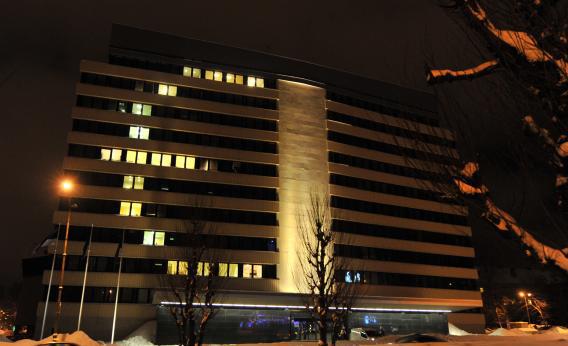Estonia’s President Toomas Ilves has never been shy about expressing an opinion. One day in 1990, when both he and I worked for Radio Free Europe/Radio Liberty in Munich, I was minding my own business in the RFE canteen, reading a Graham Greene novel* on my break.
Ilves (to pronounce his name, think “sick elvis”) ran the Estonian language service at the time and knew me primarily from the RFE basketball team. He had a great sense of humor back then, and we had both been raised in New Jersey. But he also has an irascible ideological side and that day in the canteen it became clear we wouldn’t see eye to eye.
Ilves said ‘hi’ as he walked by and then did a double take.
“Graham Greene?” he said with a look of disappointment. “They should have shot that communist 30 years ago!”
Needless to say, I was shocked. But he strode off triumphantly, no doubt feeling as though he had confronted evil. Like I said, he’s not a shy guy. Like many Baltic nationalists, his hatred of anything smacking of socialism is visceral, and as one who used his novels (The Quiet American or Our Man in Havana, for instance) to expose the West’s hypocrisy during the Cold War, Graham Greene was the enemy of such people.
It’s been a very long time since I’ve seen Ilves, who went on from RFE/RL to serve as the ambassador to the United States from the newly independent Estonia, then Estonia’s foreign minister, and finally, since 2006, its president. But you know that old saying about leopards and spots. Today, Ilves is displaying his in a digital screaming match with Paul Krugman over his country’s economic policies.
The gist of the argument is whether Ilves’ austerity policies and Estonia’s “flat tax” are due credit for Estonia’s “v-shaped” quick bounce-back from a deep recession in 2009. Krugman, like myself and many other Keynesians, have argued that overly indebted countries like the United States, Italy, the U.K., Greece, or Spain, which are subjected to austerity, will invariably fail to grow, removing the most important tool available to a country that has been living beyond its means. As such, we’ve been going around crowing whenever the obvious happens—as when the U.K.’s badly conceived austerity policies sent it back into recession earlier this year. And, similarly, the right has lionized Estonia—oversimplifying its successes and overlooking heresies like the fact that it has joined the eurozone.
That said, I think Estonia’s a different case—and a poor one for Keynesians to highlight as a failure.
Before the 2009 recession caused Estonia’s economy to plummet, for instance, the country was not a debt-ridden basket case (like Greece), nor a top-heavy casino using real estate to inflate asset bubbles (like the U.S., Spain, Ireland, or the U.K.). Indeed, Estonia entered the 2009 crisis with a budget surplus and a growing economy driven by exports. Indeed, its economy grew by over 6 percent in 2011 and has continued to perform well this year.
Estonia has positioned itself as the local home base of multinational corporations in the Baltics, bringing serious investments in its high-tech and manufacturing sectors. By joining the eurozone, it is seeking to do what Ireland does on the western side of the trading bloc. That’s not crazy—especially for a small sheep of a nation among economic wolves. Like Ireland, which fought tooth and nail to prevent the Germans from forcing it to raise corporate taxes, it’s quite rational for Estonia to seek its own, unique advantages. Otherwise, such tiny countries truly are doomed to be Greece or Portugal. As long as Estonian banks don’t lend as stupidly as the Irish (and continental) ones did, Estonia’s tack makes sense.
So maybe this was the wrong fight for Krugman to pick?
Obviously, I broadly agree with Krugman on austerity and its ills, particularly when ordered into the teeth of a storm. Estonia was austere—and prudent—before Wall Street sparked the Great Recession. And its fiscal fitness now shows.
‘One-size-fits-all’ is just as wrong when applied from the left as it is from the right. Remember, the American right would like to see Estonia’s flat tax applied in the United States, a move that would be like a second-stage booster rocket for U.S. income inequality.
Allowances must be made for culture, size, geography, and history. As hard as it is to separate politics and economics anyplace these days, in the Baltics the effort is impossible. One of three independent Baltic countries invaded and swallowed up by Stalin in 1939, Estonia had little say in its destiny until the USSR collapsed in 1992.
Once Soviet communism collapsed, some of the sons and daughters of Baltic nationalists driven out in 1939 chose to return, bringing with them very different ideas about economics. Often these ideas were radical, and often they were poorly applied. But not always, and in just about all instances, they were a vast improvement on the insanity of Moscow’s central planners.
So you can laugh at Ilves for using profanity—even a Jersey boy like me knows there’s a time and place. But I have some sympathy with his decision to call Krugman out. And, after all, if the rest of the eurozone was as careful to follow the rules of membership as Estonia was, no one would be talking about a eurozone crisis right now.
*I think it was “The Heart of the Matter,” but I’ve read most of them so can’t be sure.
